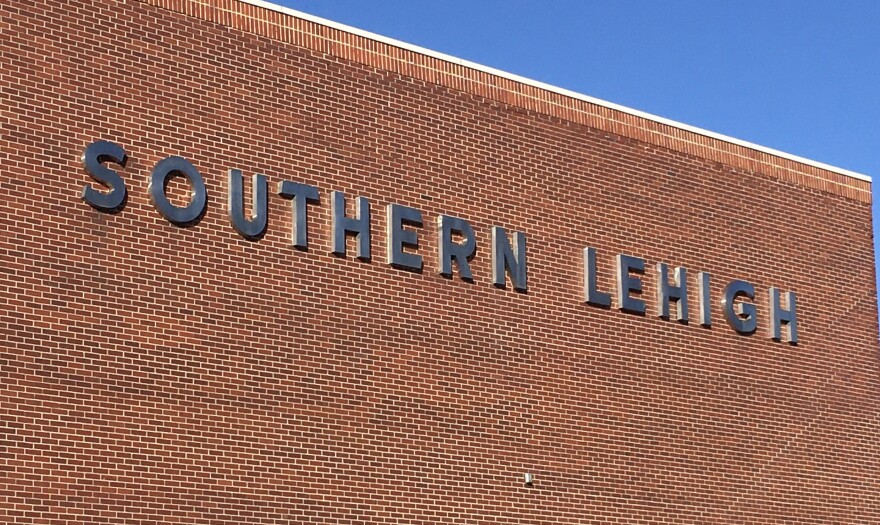UPPER SAUCON TWP., Pa. — Southern Lehigh Superintendent Karen Trinkle said the prospect of incorporating generative artificial intelligence into classrooms is both “exciting” and “scary.”
That’s why it’s essential the district has a policy to guide how and when students and staff can use generative AI — a growing technology that’s sparked debate in school districts across the country.
“I’m confident that [we] can come up with something that really supports our students and our teachers,” Trinkle said.
Last week, the Southern Lehigh School Board approved the first reading of the new AI policy at its Monday meeting.
If the final version of the policy is approved Oct. 27, Southern Lehigh would join other Lehigh Valley districts that have adopted generative artificial intelligence policies since summer 2024.
They include Allentown, Bethlehem, East Penn, Nazareth Area, Northampton Area, Northern Lehigh, Northwestern Lehigh, Parkland and Salisbury Township.
'We need to have a policy like this'
Southern Lehigh school Director Christopher Wayock said generative AI is becoming relevant to “every aspect of society.”
“If you’re not using it, you’re probably already behind the eight ball,” he said. “I think in education we need to have a policy like this.”
Southern Lehigh’s proposed policy relies mostly on a template from the Pennsylvania School Boards Association and implements language from four other school districts’ AI policies that served as inspirations.
The draft policy was developed by a stakeholder group that included administrators and a representative from the teachers union.
"If it's just a piece of paper that we put on the website I don’t know that anybody’s going to read it.”Candi Kruse, Southern Lehigh School Board Vice President
Board Vice President Candi Kruse said it’s essential that students verify they've read and understand the final policy once it’s approved.
“You can do dumb stuff with AI, and I have two small kids,” she said. “I want to make sure that my kids fully understand this.
"And if it's just a piece of paper that we put on the website I don’t know that anybody’s going to read it.”
The proposed policy describes artificial intelligence as being able to “mimic human intelligence, such as analyzing data, recognizing patterns and making decisions.”
Generative artificial intelligence tools are a type of AI that can create content through text, images, audio, video and code, the policy adds.
For instance, ChatGPT has gained widespread attention in the education world for its ability to compose essays for students, and there are also other tools students can use that complete math problems.
Such tools present concerns about responsible and ethical use.
Students, staff to get training and guidelines
The proposed Southern Lehigh policy would only allow students and staff to use district-authorized generative AI tools.
Superintendent Trinkle said the district is likely to authorize Gemini, Google’s AI assistant, instead of ChatGPT. She said that’s because the district uses Google Suite.
Students would only be allowed to use tools to complete assignments when explicitly given permission by their teacher.
According to the first public draft of the policy, generative AI tools should be cited when content is “quoted, paraphrased or otherwise used in the student’s work.” Failure to do so could result in a student conduct violation for plagiarism.
Students and staff would also get trained on how to cite original sources for statistics, dates, facts and other information or quotes.
Director Wayock said AI is a tool that many in the district are already using. The district’s policy will help provide safety guidelines for students and staff.
“Much like social media education,” generative AI training should ensure students understand which personal information should not be entered into certain AI tools as a matter of privacy protection, Wayock said.
Trinkle said the district is just beginning with AI professional development for staff.
“Whether you’re in the legal field, medical field, utility field, AI is moving extremely fast."Eric Boyer, Southern Lehigh school director
Administrators will need to create a rollout plan for AI’s use at various grade levels, she said. Students will have “complete different exposure and complete different access” based on age.
Some Lehigh County school districts are not allowing any AI use at the younger grades, such as kindergarten through third, Trinkle said.
School Director Eric Boyer suggested students get an AI “crash course” at an appropriate grade level. While that may not be a whole course on AI, teachers could allot time in other classes to train students on AI tools.
“Whether you’re in the legal field, medical field, utility field, AI is moving extremely fast,” Boyer said.
Boyer said high school students should be prepared for using AI after graduation.
“I can only imagine what five years from [now] college is going to look like with AI,” he said.
One school director sees room for improving policy draft
Under the proposed AI policy, the district would ban the use of generative AI for making “final determinations” on student grades.
School Director Emily Gehman — who was the only school director to vote against the proposed policy — criticized the draft for not being clear enough on that point, questioning whether teachers would be able to use AI to do a first look at grading student assessments.
“It says ‘final.’ How do we define final?” she said. “I think there needs to be more specific language about what ‘final [determination]’ is.”
Gehman also questioned whether the ban on using AI tools for grading would be applied to all assessments, ranging from pop quizzes to final exams.
“We can all agree, just logically, [that] student use of AI and staff use of AI are very different things, right? And [they] should be.”Emily Gehman, Southern Lehigh school director
Additionally, Gehman asked whether the district should consider having two AI policies — one for staff and one for students. She said the proposed policy seems to focus mostly on student use guidelines.
“We can all agree, just logically, [that] student use of AI and staff use of AI are very different things, right? And [they] should be.”
Gehman pushed back when Superintendent Trinkle said the policy will need to be reexamined regularly to keep up with the rapid developments in AI technology.
Gehman said the policy should be broad enough not to change regularly. It’s the policy’s administrative regulations that could be updated if necessary, she said.
Ultimately, Gehman said the draft policy “raises a lot of good questions.”
Still, she suggested the district administration take another look at the policy to make it stronger.


